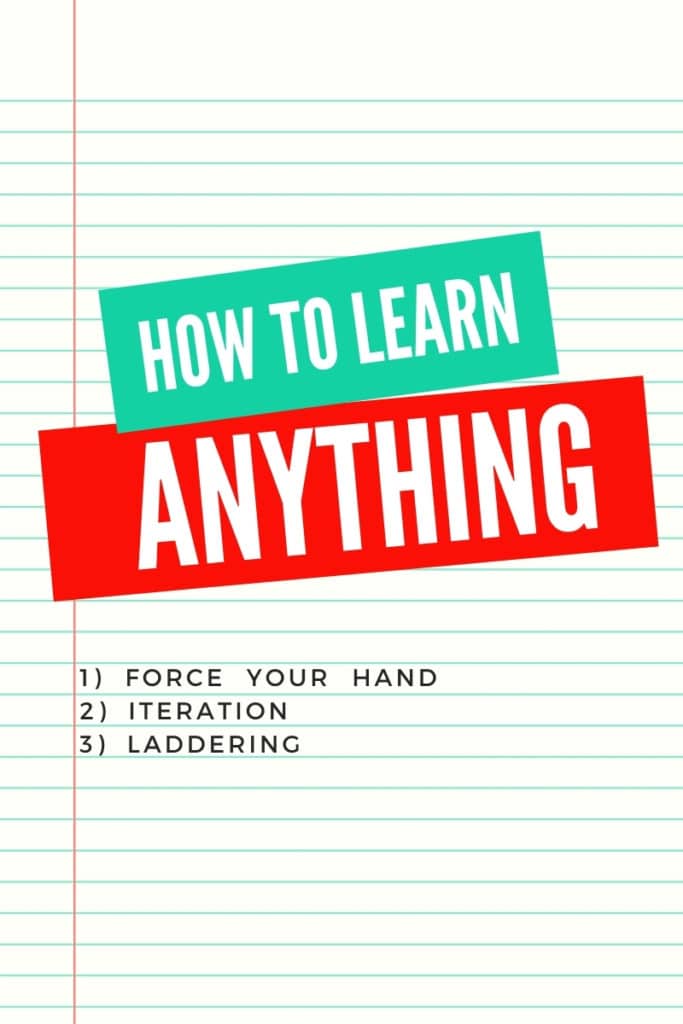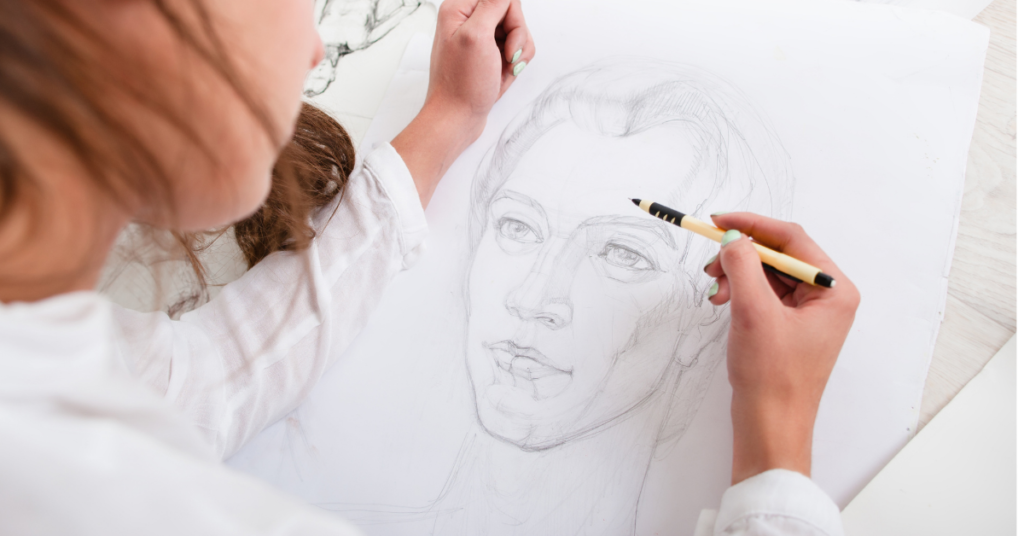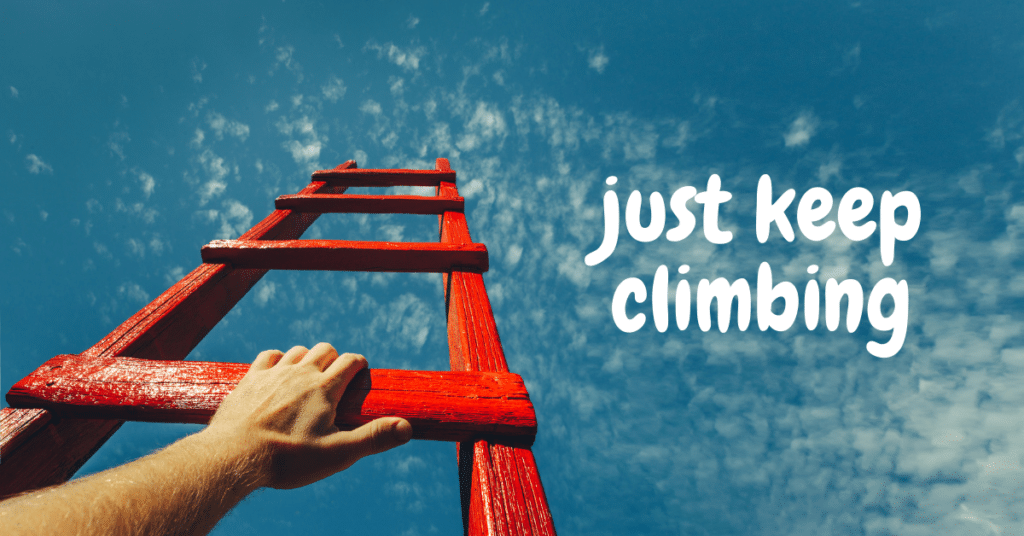By Colette Nichol, Story Strategist and Solo Filmmaker
Estimated reading time: 9 minutes

Have you ever struggled to learn something new?
You start to wonder if there’s something wrong with you because you can’t seem to progress past a certain point. You may even sit down and google, “How to Learn.”
You’re not alone. There are over 22,000 searches per month for the phrase “how to learn” and over 25 billion responses. What!?!? That’s nuts.
So let’s dig into this topic. I’ve got three main suggestions I want to share with you…but first, a story.
Learning vs. Being Born with It
I was sitting at my computer the other day, paused in silence. Not sure what I was contemplating—probably the ongoing existential crisis of spending too much time in front of a screen.
Anyway, as I was paused in silence, I heard a strange sound. It was this gentle rustling. It sounded like a tiny person was scrumpling up a piece of paper. I looked around. What was it? Then I noticed the daffodil buds on my desk were quivering. They were shaking in their vase.
Wow. I’d just heard the sound of a daffodil trying to bloom. Daffodils are encased in a fibrous envelope that dries and breaks apart when the flower blooms. Because of my good hearing, I’d heard the sound of a daffodil trying to bloom, or so I thought.

Here’s the thing, I’ve always been somebody with good hearing.
But that’s not the same thing as being a good listener. When I was in the beginning stages of learning how to record and edit audio, I began to see that there’s a huge difference between hearing and listening. Hearing is something we’re born with.
But listening, well shit, that’s something you’ve got to learn.
Listening skills are a pre-requisite for recording clean sound, editing audio, finding the right music for your films and videos, and being able to drive an interview. The good news is that, like any filmmaking skillset, listening is something anybody can learn.
How To Learn
I’ve been thinking about the concept and practice of learning for a long time.
In 2002, when I dropped out of musical theatre school, I was convinced that the methods being used in that school were largely ineffective. I didn’t see how any of us were going to learn. (Everyone except the dance teachers seemed to be winging it.)
After I quit, I decided to create my own version of theatre school by finding all the best teachers in Vancouver in various disciplines and studying with them.
I studied singing from a Russian Master who barely spoke English. I studied corporeal mime with the disciple of Etienne Decroux (the founder of corporeal mime.) I studied Meisner Technique with one of the few teachers on earth who had actually studied with Meisner himself.
These were all master teachers. They knew their material, and they knew how to help students learn.
Watching them and then later going on to teach ESL, I observed that in order to learn anything, you must have three things:
- Forced Hand
- Iteration
- Laddering
FORCING YOUR HAND
You’ve got to force your own hand in some way.
That’s why it’s so common to learn in schools or academies. By signing up for a program of study, we force our hand. We have an external force that expects us to learn. We are “forced” to learn because of the position we put ourselves in.
For many people, a simple online course is enough to force one’s hand. For others, a deadline or due date is required. When I decided I was going to improve my colour grading skills, I knew I would have to force my hand aggressively. If not, I’d never make myself learn DaVinci Resolve. (DaVinci resolve is a complex colour grading and editing software.)

I bought a camera and started shooting all my projects in a flat cinema profile that made it necessary for me to learn colour grading. (I already knew the basics, but I wanted to get better.)
I forced my hand by making the only route to success, one that involved getting better at color grading.
The next critical element of learning is iteration.
ITERATION IS THE BEST WAY TO LEARN
Many people think that they need to start their learning path by making one outstanding project.
The aspiring filmmaker wants to make an incredible narrative short film win a trazillion awards and instantly become a go-to director. The new screenwriter wants to write a feature film that brings people to tears.
But this is a setup for disastrous failure. Instead, you need to iterate. Start with a small project.
Then repeat that small project. Either do the exact same project over again or do something very similar. This sounds boring, but it’s not. When you’re learning, and in hard-core struggle mode, iteration isn’t boring at all. It’s highly satisfying because, with each iteration, you get better and better. You see measurable improvements.

FOLLOW IN THE FOOTSTEPS OF THE MASTERS
Why does an artist often make multiple mini sketches of new work before they set about to tackle the canvas? Why do we do a pre-interview and test photography in filmmaking? Why do designers make multiple mock-ups before finalizing the design?
Iteration.
We get better with each new attempt. But you can’t iterate quickly when you start out tackling a feature film or some other massive project.
You also can’t iterate easily when you start out with crew-based filmmaking. It takes a lot of energy and production skills to gather a team and make a short film. It can take 6-12 months to bring a short narrative film to completion. It could take you 5 years to make 5 short films.
So if you’re planning on learning filmmaking, this isn’t the best route.
Instead, grabbing your camera and sound gear and making a multitude of microfilms will allow you to train your eye, learn to listen, practice with your gear, and practice visual and emotional storytelling (not to mention editing!)
LADDERING MAKES IT EASIER
To learn, we must stretch, but not too much. Laddering means you’re building up your skills step-by-step.
You’re not going from rung 1 on the ladder to rung 7. Instead, you’re going up the ladder, rung by rung. You start with something simple and foundational. Then you build on it.
For example, if you’re a young actor, you don’t start out playing Hamlet. That’s the last rung of the ladder. That role is so complex that many actors don’t tackle the role until they are late in their careers. Instead, you start with a small role with just a few lines.

If you begin a painting practice, you’re not going to tackle a multi-wall mural-like Diego Rivera. That’s where you might be heading. But you start at the first rung, learning your medium, getting to know the material.
If you combine Laddering, Iteration, and Forcing Your Hand, you can learn anything. There is a caveat, of course. You must be interested. These days, most experts agree that inborn talent isn’t relevant. Nobody is born a painter or high jumper or equestrian or a filmmaker. You’re born as a person with infinite potential. The question is this: how will you apply yourself to pursue your dreams, visions, and curiosities?
I should also say that one more key ingredient to successful learning is accepting our mistakes and failures. As we learn, we’re bound to get things wrong a lot. We fall. Feel discouraged. Then we get back up and try again.
If you can combine laddering, iteration, and forcing your hand with failure resilience, there’s nothing you can’t learn.
BACK TO THE DAFFODILS
Those daffodils I thought were blooming? Turns out they were screaming for attention. I’d forgotten to put water in the vase. Duh. So they were shaking their fists at me and yelling for water. On the bright side, now I know what an angry daffodil sounds like. That’s something new.
Related Questions:
What is the best way to learn?
- Short spurts of learning are best. Aim for 30 to 60-minute blocks of learning rather than cramming for 4 hours.
- Learn over longer periods of time, but stay consistent. It’s better to learn a new and difficult skill by practicing daily rather than attempting to learn overnight or in a week-long intensive.
- Get rid of any distractions while learning new material.
- A relaxed mind learns best. So try to stay calm, breathe deeply, and make learning enjoyable.
- PPP is a teaching technique that stands for Present, Practice, Produce. You can apply this to your own learning. First review the material. Then practice on a very small scale with exercises. Then try to produce a work or some kind with what you’ve learned.
- Most people require multiple interactions with the material in order to learn. Read it. Hear it. Repeat it. Write it. Discuss it. Then produce something.
- Teaching others (or trying to) can be a great way to learn. It solidifies learning.
- Stay hydrated and get lots of sleep. Being without sleep can turn us into zombies, making learning impossible. Lacking sleep causes our brain to slow down. It’s the equivalent of being drunk!
- Review material before bed. A night’s rest helps to solidify learning. If you need to memorize something, reviewing before bed can help a lot.
What is an easy way to learn?
Is there any easy way to learn? One thing that makes learning easier is if you choose to learn things you’re passionate about. If you’re learning something you don’t care about then it will be a struggle. Follow the other tips above if you want to make learning more effective.
How can I learn to remember faster?
Learning to remember means practicing memorization techniques. I’ve written a whole blog post about this topic. Click here to learn more about memorization > While the post I wrote is about memorizing a script, the principles apply to everything.
Learn Filmmaking and Get the Gear Guide
If you’re interested in learning filmmaking, check out the Solo Filmmaking Mentorship Program I created for aspiring filmmakers and video creators. It usually goes live once per year. So I recommend getting the Story Envelope Filmmaking letter which comes out a couple of times per month. That way, you can get filmmaking tips for free and find out when the filmmaking course is going live again.
Also, before you go, grab the Solo Filmmaking Gear Guide and Checklist for Beginners.

About the Author
Hi! I’m Colette Nichol. I’m a solo filmmaker and story strategist based out of rainy Vancouver, Canada. I’ve been making videos and micro films for small businesses and global brands since 2014.
Plus, I LOVE to help aspiring filmmakers pursue their dreams and start making films. This blog is designed to help you gain the knowledge you need to become a filmmaker.
If you want more, get on the waitlist for the Story Envelope Academy Solo Filmmaking Mentorship Program. It opens up one time per year and is the best way to become a filmmaking or video pro fast!
CLICK HERE to get on the solo filmmaking mentorship waitlist.